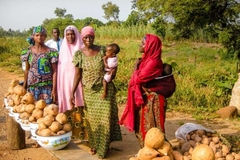IFPRI calls for climate, nutrition and gender policy integration after success in Nigeria
The International Food Policy Research Institute (IFPRI) believes that the recent success of the Gender, Climate Change, and Nutrition Integration Initiative (GCAN) in the Nigerian states Kano and Adamawa can be applied in other states and regions to bring similar reforms, especially in climate-vulnerable areas.
GCAN is also implemented in countries like Ethiopia, India, Kenya, Nigeria, and Senegal. The organization believes climate policies should be integrated with people’s well-being and equity.
Climate change is significantly impacting Nigeria by reducing agricultural productivity, raising food prices, and limiting access to nutritious food, warns IFPRI.
Action plans
In Adamawa, the initiative is uniting stakeholders to emphasize that rules should be tailored to the state’s needs, community-based organizations, and women’s groups.

The Environmental Care Foundation, IFPRI’s partner, is hosting policy discussions to identify gaps and suggest recommendations for securing Adamawa’s climate resilience.
In Kano, the GCAN team is helping the government create and apply a roadmap to bring policy action. IFPRI’s partner, Aliko Dangote University of Science and Technology, Wudil, will provide research sponsorships on solutions to climate, nutrition, and gender integration.
According to IFPRI, programs on climate-smart agriculture and facilitating access to finance for female farmers are also being developed.
 IFPRI highlights progress in Kano and Adamawa states as a model for integrating climate, nutrition, and gender policy to address Nigeria’s food insecurity.Community outreach programs to educate women farmers on climate-smart agriculture and facilitate access to finance are also being developed.
IFPRI highlights progress in Kano and Adamawa states as a model for integrating climate, nutrition, and gender policy to address Nigeria’s food insecurity.Community outreach programs to educate women farmers on climate-smart agriculture and facilitate access to finance are also being developed.
Climate, gender, and nutrition intersections
In Nigeria, climate change impacts affect women and other disadvantaged social groups the most due to systemic inequalities in access to resources, decision-making, and economic opportunities, says IFPRI.
According to the UN FAO, 34% of children under five are stunted and 70% of Nigerians suffer from moderate or severe food insecurity.
In Kano and Adamawa, climate impacts are driving high malnutrition rates and gender inequities, according to IFPRI. There are 10.5 million people living in poverty in Kano and 3.4 million in Adamawa. Also, women’s bargaining power in households is limited in northern and northeastern Nigeria, preventing them from making decisions on how to respond to climate risks.
These problems are why the organization and its partners decided to implement GCAN and engage with key stakeholders.
Progress in Kano and Adamawa
Last year, GCAN in Kano and Adamawa was implemented through gender-responsive advocacy, nutrition-sensitive climate change policy engagement, and partnerships with governments, civil society organizations, and international development partners.
 Through partnerships and outreach, GCAN-supported policies in Nigeria now promote climate-smart agriculture, women’s empowerment, and nutrition access.Early this year, Kano enacted a revised Climate Change Policy — “a landmark achievement” that included gender-responsive climate actions and enhanced nutrition outcomes.
Through partnerships and outreach, GCAN-supported policies in Nigeria now promote climate-smart agriculture, women’s empowerment, and nutrition access.Early this year, Kano enacted a revised Climate Change Policy — “a landmark achievement” that included gender-responsive climate actions and enhanced nutrition outcomes.
The policy aims to ensure equitable access to climate-smart technologies and agricultural inputs, and set gender-specific targets. It also seeks to support women’s access to credit, land rights, and training in climate-smart agriculture practices.
Furthermore, the policy encourages the cultivation of nutrient-dense and biofortified crops to enhance dietary diversity and nutrition, focusing particularly on children and pregnant women.
Meanwhile, in Adamawa, GCAN established the Climate Change Sector Working Group to take on a more coordinated approach to addressing climate change, supported by the government.
Meetings were conducted to incorporate gender and nutrition into climate policies, along with a review of the national climate change policy to ensure alignment of national goals with the specific needs and contexts of Adamawa.
Additionally, the Savannah Climate Research Centre was proposed as the research and knowledge hub for the Climate Change Sector Working Group.
In other news, the UN Office for the Coordination of Humanitarian Affairs warned that the upcoming lean period will worsen the humanitarian crisis in Nigeria’s Borno, Adamawa, and Yobe states. The organization launched a plan alongside the Nigerian government, which implements a multisector approach for these states focused on urgent food security.
Nutrition Insight also recently spoke to Aries Consult about the importance of policy intervention, gender-responsive land reforms, climate-resilient crop diversification, and African hybrid technologies.















